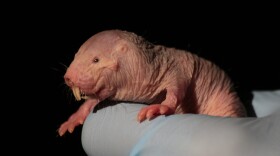Rae Ellen Bichell
Rae Ellen Bichell is a reporter for NPR's Science Desk. She first came to NPR in 2013 as a Kroc fellow and has since reported Web and radio stories on biomedical research, global health, and basic science. She won a 2016 Michael E. DeBakey Journalism Award from the Foundation for Biomedical Research. After graduating from Yale University, she spent two years in Helsinki, Finland, as a freelance reporter and Fulbright grantee.
-
Twenty years. That's how long two grad students, Sonia Vallabh and Eric Minikel, think they have before a deadly disease envelops Sonia's brain. The Massachusetts couple is now racing to find a cure.
-
Sonia Vallabh knows that by the time she's middle-aged, a rare inherited disease will likely start killing off her brain cells. She and her husband have become scientists to try to stop the disease.
-
The small spacecraft is set to hurtle toward the sun at about 450,000 miles per hour. Scientists hope it will clear up some big mysteries, such as why the sun's atmosphere is hotter than its surface.
-
The hairless, ground-dwelling, cold-blooded rodents have proven capable of surviving total oxygen deprivation. Their odd biology allows them to run on an alternative fuel.
-
Researchers found that a protein in human umbilical cord plasma improved learning and memory in older mice, but there's no indication it would work in people.
-
They're the Godzillas of the virus world, pushing the limit of what is considered alive. Researchers are trying to figure out where they came from. (And no, they aren't known to make people sick.)
-
Researchers following a group of New Zealanders over the course of 40 years found an association between childhood lead exposure and declines in intelligence and socioeconomic status later in life.
-
They don't have wings, but bacteria sure can fly. Researchers at MIT say that tiny bubbles trapped by raindrops play a part in launching bacteria on long-distance flights.
-
Scientists say they've found the remains of tube- and string-like organisms in Canadian rocks that are at least 3.7 billion years old. But findings like these are always controversial.
-
Wild hogs inflict $1.5 billion in damage on U.S. property each year. But biologists can now track the elusive animals via tiny bits of DNA the swine leave behind in puddles and ponds.









